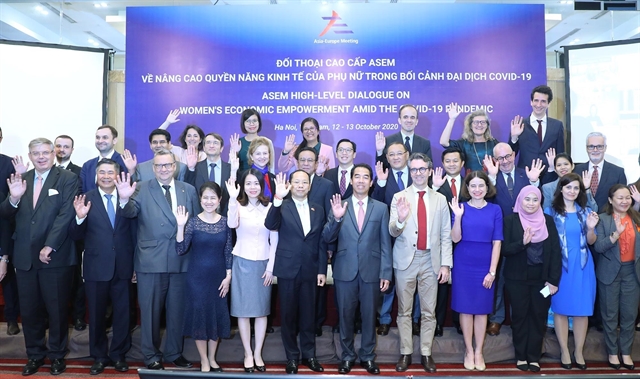
HÀ NỘI — The Asia-Europe Meeting (ASEM) should strengthen co-operation between Asia and Europe, and unify awareness to have co-ordinated policies to enhance women's empowerment to cope with the COVID-19 pandemic and achieve post-pandemic economic recovery, said Tô Anh Dũng, Deputy Minister of Foreign Affairs of Việt Nam.
He made the statement at the ASEM High-level Dialogue on Women’s Economic Empowerment amid the COVID-19 pandemic which was held by the Vietnamese Ministry of Foreign Affairs and Ministry of Labour, Invalids and Social Affairs on Monday.
The event drew nearly 130 online and offline participants including government officials, senior policymakers, researchers, entrepreneurs and representatives from universities, regional and international institutions in Asia and Europe.
This year marks the 75th year of the Charter of the United Nations, the first international agreement to affirm the principle of equality between women and men, as well as the 25th anniversary of the Beijing Declaration and Platform for Action, a historic roadmap that envisioned a world where each woman and girl can exercise her choices, he said.
As an important inter-regional forum bringing together 53 members from Asia and Europe, ASEM has made important contributions to promoting gender equality and enhancing economic empowerment for women.
“ASEM needs to be a pioneer in realising the goal of 'not leaving anyone behind' and not leaving any women behind,” he said.
Sok Siphana, ASEM Senior official for Cambodia, said he appreciated Viet Nam’s initiative, emphasising that the dialogue contributed to promoting ASEM’s commitment to gender equality and women’s empowerment. It would propose key recommendations for submission to the 13th ASEM Summit to take place in Cambodia in 2021.
Speaking at the meeting, Caitlin Wiesen, United Nations Development Programme Resident Representative in Viet Nam, said the UNDP-UN Women rapid assessment of COVID-19 impact on vulnerable households and enterprises conducted during April and May in Viet Nam (as well as UNDP-supported assessments of COVID-19 socio-economic impact in many other countries in the region) showed the pandemic has disproportionally impacted women.
“Jobs and incomes of women have been reduced in heavily-affected sectors such as garment and footwear, education and health care, tourism and related services where female workers dominate, temporarily pushing many of them into poverty or deeper in poverty,” she said.
“Amid the COVID-19 pandemic, women’s economic empowerment – the topic of the today’ dialogue – was more important, if not vital, to integrate in countries’ response and recovery plans and actions if they are to be effective.”
To contain the virus and address its negative socio-economic impact, Wiesen suggested ASEAN countries adopt a number of solutions including maintaining focus on accelerating and sustaining progress towards achieving the Sustainable Development Goals, gender equality and leaving no one behind.
It was necessary to recognise the COVID-19 pandemic as a health crisis with serious and far-reaching socio-economic consequences.
“As the risk of a COVID resurgence will remain high until a safe and effective vaccine and/or treatments are widely available, the governments should prioritise public health and safety, especially in health care institutions where women comprise 75 per cent of the health workforce in the world,” she said.
Wiesen said top priority must be to assist those vulnerable to extreme poverty.
It was essential to provide specific support for women-led businesses by expanding access to credit which is critical for women-led household business and micro and small enterprises or enhancing women’s labour mobility through reskilling and job matching services.
She also said it was key that gender equality was mainstreamed in responses and places women’s economic empowerment at the centre of recovery actions.
The two-day dialogue, which ends on Tuesday, aims to provide a platform for ASEM partners to promote regional and inter-regional co-operation on women's economic empowerment and inclusive growth in the digital age, as well as rebuilding more equal, inclusive and resilient societies in post-pandemic recovery. — VNS